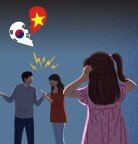Moon underscores the role of government in policy speech
Moon underscores the role of government in policy speech
Posted November. 02, 2017 07:32,
Updated November. 02, 2017 09:07
President Moon Jae-in delivered a policy speech at the National Assembly on Wednesday to submit his government’s 429 trillion won budget bill, where he outlined key policy objectives – people-oriented economy, eradication of accumulated evils and peace on the Korean Peninsula, while emphasizing the bigger role of government. This suggests that the government, not an individual, will take the initiative in economic, social and national innovation in a situation where the nation’s middle class practically collapsed as the 1997 Asian financial crisis left millions of people unemployed. Addressing the nation at the parliament, Moon underscored the duty of the state for its people with the most mentioned word “people” as many as 70 times, followed by “economy” (39 times), “state” (25 times) and “country” (14 times). The eradication of deep-rooted evils mentioned only once.
Moon’s judgment is accurate in that Korean people have been forced to be in the rat race, have put everything into children’s education not to pass down their failure and have forgotten the ideas of compromise and concession in this harsh reality intolerant of failure over the past two decades. His speech struck home of what the Korean society has been going through – in the aftermath of the 1997 financial crisis, economic polarization undermines growth and integration, people are frustrated by the obsolete rules and practices and are suffocated by unjust power. His message calling for taking a step back from absurdity of the past and making a leap forward towards a better future holds significance. In order for Korean people to reap the fruits of their efforts and labor, the government should make utmost efforts to push forward with innovative economic policy and root out corruption and irregularities through reform of the prosecutors.
In his address to the parliament, Moon declared that he will turn the conglomerate-led economy into the people-oriented one. Without a fundamental shift in paradigm, there is no other ways to break through this absurdity where the fruits of growth are not shared by people even if the size of the economy grows. President Moon seems confident that his three pillars of economic policy including job and income-led growth, innovative growth and fair economy, will give an answer to the problem of low-growth economic polarization that the world is trying to solve.
No one would oppose a great cause of resolving long-standing economic issues. However, if the government intends to expand the state’s intervention in response to neoliberalism that has exposed the harmful consequences of laissez-faire, this could harm the principles of freedom and competition. Economic polarization in South Korea is attributable to a failure to practice a free market economy, not neoliberalism. That is to say, it is because the market economy has failed to function properly due to government-finance and politics-business collusion. Big government should make up for the failure of market economy. Income-driven growth, one of the key means promoting a people-oriented economy, is an unprecedented test to create a virtuous cycle of higher-income households, more invigorated domestic demand and rising business investment. Unfortunately, this idea is only possible in a closed economy in which a country conducts no trade with foreign nations.
The budget bill is not a simple distribution of resources by area, but is in line with some controversial policies. Corporate tax hike, for instance, may be passed on to consumers and workers, and the minimum wage increase is directly related to the quantity and quality of jobs. There is also a great concern that the national debt will shot up astronomically due to the increase of the number of public servants and various benefits. The National Assembly should thoroughly examine each issue in the budget deliberation process. It is time to control the speed to get the economy back on the right track.







